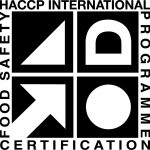The floor plays a crucial role in addressing contamination risks. An inadequate floor finish can become a prime site of bacteria build-up. Not only does the floor have to provide a hygienic surface, it needs to do so while withstanding corrosive chemicals, moisture, impacts and thermal shock. If it cannot stand up to these conditions then the floor can quickly fail – leading to germs and pathogens infiltrating hard to clean cracks.
The internationally recognized Hazard Analysis and Critical Control Points (HACCP) management system provides a set of guidelines to ensure that the production process is as hygienic as possible. Topkrete’s polyurethane flooring range has achieved HACCP International Certification thanks to its ability to create a food safe floor area.
To meet the HACCP International standard, floors also need to allow for adequate drainage and cleaning. Our flooring product like coating can be laid to falls and incorporate stainless steel drainage to effectively channel contaminants and excess liquid out of the area. Coving can also be incorporated to create a seamless easily cleanable transition to the wall and even the floor’s texture can be tailored to best suit the on-site cleaning regime.
The key aspects of Deckrete that make it an ultra-hygienic flooring system include its seamless, impervious, highly durable nature combined with its ability to incorporate coving and stainless steel drainage.
HACCP guidelines state that a seamless and impervious finish must be maintained at all times, even when subjected to a large-scale food processing facility’s intense working environment. Our flooring product has been specifically formulated to provide a surface that will comply with food industry regulations for an extended period of time despite the sector’s inherently challenging conditions
Our polyurethane flooring systems that certified as suitable for use in Food and Beverage Facilities that operate in accordance with a HACCP based Food Safety Programme:
DECKRETE MF DECKRETE HFWhat is HACCP?
From Wikipedia, the free encyclopedia
 Hazard Analysis Critical Control Points (HACCP) is an internationally recognized method of identifying and managing food safety related risk and, when central to an active food safety program, can provide your customers, the public, and regulatory agencies assurance that a food safety program is well managed. HACCP is a management system in which food safety is addressed through the analysis and control of biological, chemical, and physical hazards from raw material production, procurement and handling, to manufacturing, distribution and consumption of the finished product. The HACCP system can be used at all stages of a food chain, from food production and preparation processes including packaging, distribution and many more.
Hazard Analysis Critical Control Points (HACCP) is an internationally recognized method of identifying and managing food safety related risk and, when central to an active food safety program, can provide your customers, the public, and regulatory agencies assurance that a food safety program is well managed. HACCP is a management system in which food safety is addressed through the analysis and control of biological, chemical, and physical hazards from raw material production, procurement and handling, to manufacturing, distribution and consumption of the finished product. The HACCP system can be used at all stages of a food chain, from food production and preparation processes including packaging, distribution and many more.

